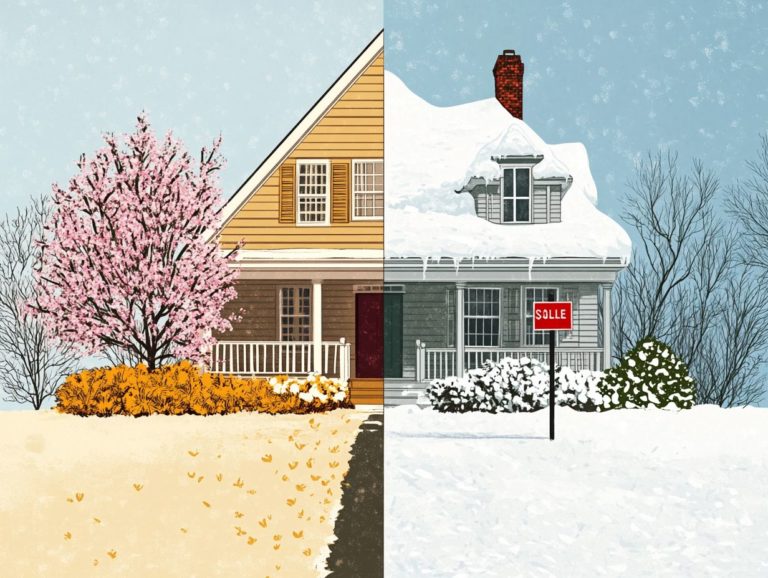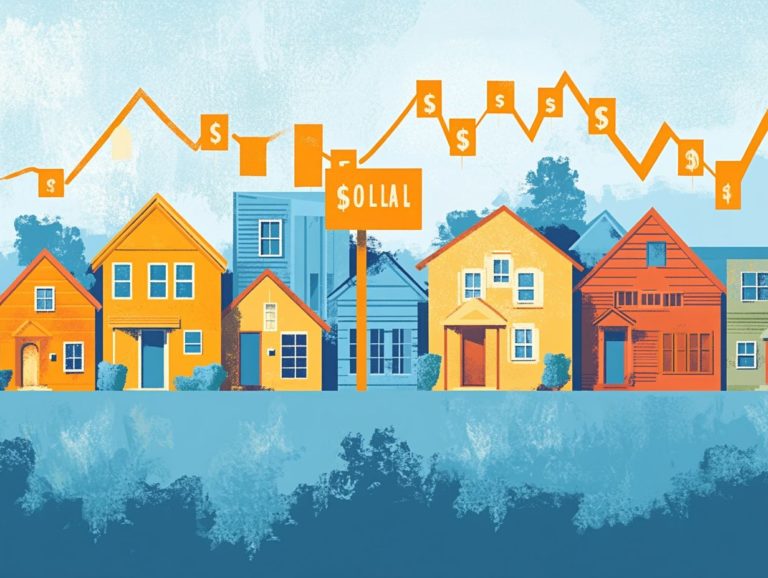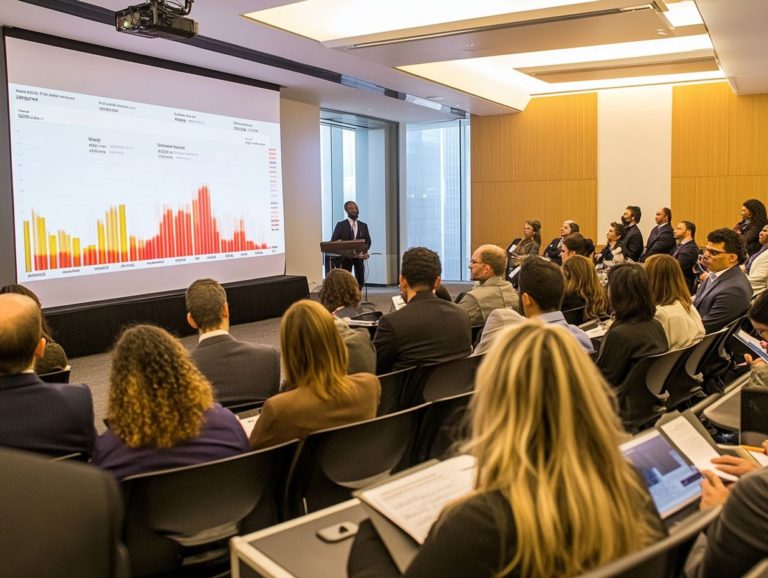The Role of Mortgage Rates in Home Buying
Navigating the realm of mortgage rates can be a complex yet vital element of your home-buying journey. Understanding mortgage rates is essential for anyone considering financing a home purchase or refinancing an existing mortgage.
Mortgage rates dictate the interest you’ll pay on your borrowed amount over the loan term. The interest you incur often represents a substantial portion of your monthly mortgage payment and can vary significantly among lenders. Securing a lower interest rate can save you thousands, underscoring the importance of grasping how these rates operate and their impact on your overall homeownership experience.
Contents
Key Takeaways:

Mortgage rates are crucial they determine your borrowing costs. Understand them to make smart choices. Watch economic trends and partner with a trusted lender for the best rate.
Your choice between fixed and adjustable rates can shape your financial future. Align your rate type with your financial goals!
Understanding Mortgage Rates
A mortgage is essentially a loan tailored for purchasing real estate, with the property acting as collateral. The mortgage interest represents the cost of borrowing that money, typically expressed as an Annual Percentage Rate (APR), which shows how much borrowing will cost you each year. Grasping this definition is vital as it sets the stage for navigating the intricate landscape of various loan options available to you.
The type of mortgage interest you choose can significantly affect several financial factors throughout your repayment journey. For example, you might encounter:
- Fixed-rate mortgages, where the interest remains steady for the duration of the loan, offering you stability and predictability.
- Adjustable-rate mortgages that vary periodically based on market conditions, which can lead to fluctuating monthly payments and pose risks depending on your financial situation.
With such options at your disposal, it s essential to evaluate your budget and long-term financial goals. This ensures you select the loan type that best aligns with your needs and risk tolerance.
Factors that Affect Mortgage Rates
Several factors significantly influence mortgage rates, which tend to fluctuate based on prevailing economic conditions and market trends. The Federal Reserve plays a pivotal role in this landscape, as its monetary policy directly impacts the cost of borrowing.
Your personal financial profile affects your mortgage rate. Elements like your credit score, loan-to-value ratio, and debt-to-income ratio will influence the rate offered to you by mortgage lenders. By grasping these dynamics, you empower yourself to make informed decisions about your mortgage options, ultimately positioning yourself to secure a more favorable rate.
Don’t wait! Act now to secure the best rate! Consider exploring more resources or consulting with a mortgage professional for personalized advice.
Economic Conditions and Market Trends

Economic conditions and market trends affect mortgage rates significantly. When inflation rises, purchasing power decreases. This forces the Federal Reserve to adjust interest rates for economic stability.
These adjustments can cause fluctuations in mortgage rates. This may lead you to reevaluate your budget and long-term financial strategies.
High inflation often leads to increased construction costs. It also results in a limited housing supply, worsening competition in the market.
As mortgage rates climb in response to these economic shifts, certain areas may become financially out of reach, altering market demand.
Understanding this cycle is crucial. Staying informed about economic indicators empowers you to make smart choices in this ever-evolving landscape.
Types of Mortgage Rates
Mortgage rates present a spectrum of options, mainly into fixed-rate and adjustable-rate mortgages.
A fixed-rate mortgage secures your interest rate for the entire loan term. This ensures that your monthly payments remain consistent.
On the other hand, an adjustable-rate mortgage may seem appealing with a lower initial rate. However, this rate can fluctuate over time, potentially increasing your monthly payments.
There are also specialized options like interest-only mortgages and jumbo loans that cater to specific borrower needs. Understanding these options is essential as you select a mortgage that fits your financial situation.
Fixed vs. Adjustable Rates
The main difference between fixed and adjustable-rate mortgages is stability versus variability. A fixed-rate mortgage offers stability, allowing for consistent payments over time.
Conversely, an adjustable-rate mortgage may provide a lower initial rate, but be cautious, as this rate can change after a set period.
Choosing between these two loan types can greatly influence your financial landscape. Fixed-rate mortgages are often preferred by those who value security and plan to stay long-term.
Adjustable-rate mortgages may appeal to buyers who expect to move after a few years, allowing them to take advantage of lower initial rates without long-term risks.
Carefully weigh the benefits against uncertainties. Market volatility might lead to payment increases that strain your budget.
The Impact of Mortgage Rates on Home Buying
Mortgage rates greatly influence your home buying journey, directly affecting affordability and purchasing power.
Securing a lower rate can lower your mortgage cost. This helps you consider a larger loan amount.
However, if rates rise, your budget may tighten, prompting a necessary reevaluation of your desired home or loan options.
It’s important to understand how mortgage rates affect your budget while navigating the real estate landscape.
How Rates Affect Affordability and Purchasing Power

Mortgage rates play a crucial role in determining your affordability and purchasing power. They effectively shape the price range of homes you can consider.
When rates rise, your monthly payments can climb, which may limit your ability to buy a home within your budget.
On the other hand, lower interest rates can enhance your purchasing power. This opens doors to properties that once seemed financially out of reach.
For instance, if mortgage rates rise from 3% to 4%, your monthly payments on a $300,000 home could increase significantly. This shift might lead you to rethink your options, prompting you to explore smaller homes or properties in less desirable neighborhoods.
Conversely, if rates drop, that same buyer could expand their search to include newly constructed homes or properties with added amenities.
In both cases, fluctuations in mortgage rates are pivotal factors influencing your decisions regarding your future home.
Tips for Getting the Best Mortgage Rate
You must secure the best mortgage rate to maximize your buying power! There are several strategies to help you achieve this.
Improving your credit score can profoundly influence the interest rates mortgage lenders offer you. Making a substantial down payment can also help you secure better rates.
Don t overlook the importance of shopping around for lenders. Exploring various options can reveal competitive rates. You might also consider purchasing discount points to further reduce your rate.
Timing your entry into the market to take advantage of favorable economic conditions can work to your advantage. For homeowners, exploring refinancing options can provide significant benefits, allowing you to secure better terms over time.
Factors to Consider and Strategies to Use
When hunting for the best mortgage rate, several key factors come into play. A significant down payment is crucial, as is exploring down payment assistance programs.
These strategies can greatly influence your monthly interest and mortgage payment. Ultimately, they impact your financial stability as a homeowner.
Navigating the pre-approval process can significantly bolster your negotiating power. A robust pre-approval, supported by a thorough review of your credit history and financial documents, sends a clear message to lenders that you are a serious candidate for financing.
Utilizing discount points upfront fees that reduce your future monthly interest can be a savvy move for those looking to save over time. By mastering and leveraging these elements, you can effectively lower your total mortgage costs and set the stage for a more manageable payment plan.
Frequently Asked Questions
Curious about mortgage rates and their impact on home buying?

Mortgage rates refer to the interest rate that a borrower must pay on their home loan. These rates significantly affect the total cost of a home and the monthly mortgage payments, ultimately impacting the affordability of a home purchase.
How are mortgage rates determined?
Mortgage rates are determined by various economic factors, including inflation, the housing market, and the overall health of the economy. Lenders also consider the borrower’s credit score, down payment amount, and loan term when determining the interest rate for a specific mortgage.
Why do mortgage rates fluctuate?
Mortgage rates can fluctuate daily or even hourly. They are primarily influenced by current market conditions and can change in response to economic events, such as changes in the Federal Reserve’s monetary policy or global economic instability.
Ready to explore your mortgage options? Contact a financial advisor today for personalized advice and take the next step towards homeownership!
How do mortgage rates impact home affordability?
Mortgage rates are key to how affordable a home purchase is. Higher rates lead to higher monthly payments, which can strain buyers’ budgets.
In contrast, lower rates make homeownership more appealing and easier to manage financially.
How can I secure a lower mortgage rate?
To get a lower mortgage rate, focus on having a strong credit score and a stable income. A larger down payment can also help you secure better terms.
Shop around and compare offers from different lenders to find the best deal. You can even pay upfront fees to lower your interest rate over time.
Can I still buy a home if mortgage rates are high?
Absolutely! You can still purchase a home, even with high rates. Just be ready to adjust your budget and expectations.
Consider looking for more affordable homes, increasing your down payment, or opting for a shorter loan term to get a better interest rate. Collaborate closely with your lender and real estate agent to navigate your options effectively.






